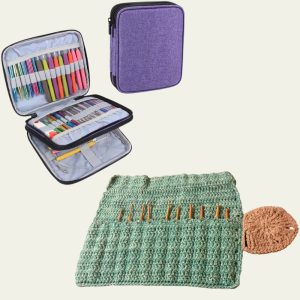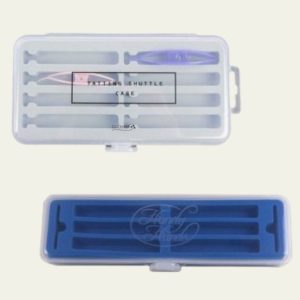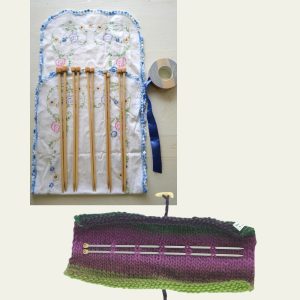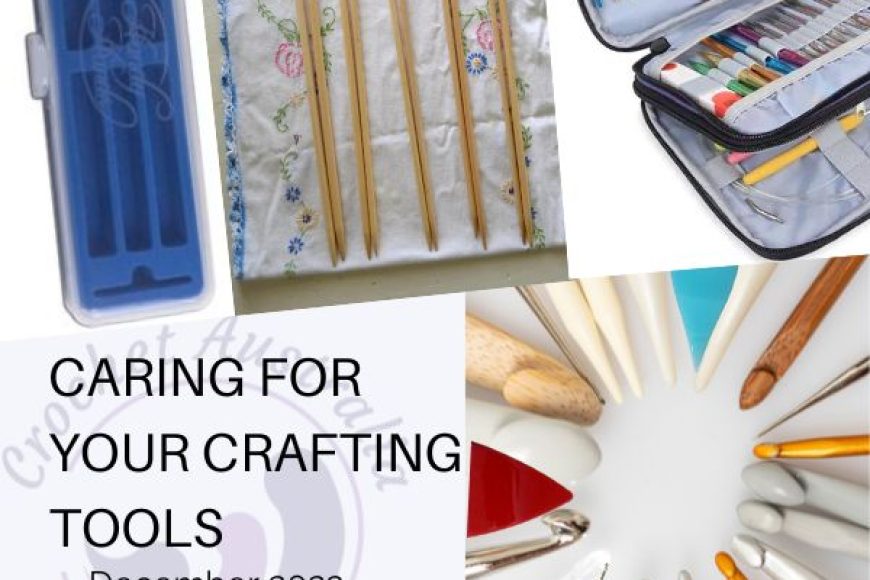Caring for your Crafting Tools
The tools of our trade (or craft in this case) are just as important to produce a good quality end product as is the choice of yarn and pattern. Therefore storing and caring for them is important to ensure they work well and last a long time. Below are some tips I’ve picked up about looking after your tools:
Crochet hooks.
Storage – don’t put your hooks into a bag or box where they can bang together. This can create pits in the hooks and then they will snag your work. Store them in a specially made case which separates them – you can buy one, or make one – or roll them in a piece of felt keeping them separated. These cases also make it easier to find and transport your hooks. See the selection of hook cases we have available here
snag your work. Store them in a specially made case which separates them – you can buy one, or make one – or roll them in a piece of felt keeping them separated. These cases also make it easier to find and transport your hooks. See the selection of hook cases we have available here
Cleaning – yes cleaning. You may wash your hands before you crochet, however the oils in our skins build up on the hooks and can transfer to the yarn used in our project and make the hooks ‘drag’. The method of cleaning depends on what the hook is made from:
• Aluminium and plastic crochet hooks – wash them in warm water and a mild detergent, and dry completely before storing.
• Steel – soak them in rubbing alcohol and dry with a soft cloth before storing.
• Wood – use oil for woods (not water) and buff with beeswax to protect the wood.
Beeswax can also be used on aluminium and steel hooks as it keeps the yarn sliding smoothly over the hook.
For frequently used hooks, it is recommended to clean every 3 months.
Pitted hooks – aluminium and steel hooks can still pit over time – once pitted they can’t be fixed and it will be time to get a new hook. Wooden hooks however can be sanded with superfine sandpaper or a fine emery board until smooth. Then apply wax or polish.
Tatting shuttles (Thanks to the Tatting Guild Australia—Victoria Branch)
Storage – Like crochet hooks, storing shuttles in cases can preserve their life. This will help to stop them getting cracked and broken, and make them easier to find.
and make them easier to find.
Cleaning
• Bone, horn and ivory shuttles benefit from natural oils in the skin, so use periodically.
• Silver shuttles – moisture in the air can tarnish them. Save those silica gel sachets from your handbag and shoes and place these with your silver shuttles to absorb moisture.
• Celluloid shuttles – these give off fumes that can damage silver, metal and plastic shuttles, so store them separately.
Knitting Needles
 Storage – Like crochet hooks, storing knitting needles in cases can preserve their life. They need to be kept out of extreme temperatures. Holders can be bought or make them yourself.
Storage – Like crochet hooks, storing knitting needles in cases can preserve their life. They need to be kept out of extreme temperatures. Holders can be bought or make them yourself.
• Use point protectors when needles are stored – so that the tips don’t chip (particularly if you don’t have a storage case). This will also stop your loops falling off.
• Circular cords – calm down the curl by dipping them in hot (not boiling) water – then pull them out and give a ‘gentle’ tug to straighten. This also applies to the extended tunisian hooks.
• Plastic needles – if these begin to bend/curl, straighten them by holding over the steam from boiling water. When straight plunge them into cold water to set.
Cleaning
• Cleaning guidelines for crochet hooks apply to knitting needles.
Yarn and tapestry needles
• When not in use store in a case. Don’t be tempted to stick them into your furniture – not only are they easy to lose this way, but this will dull the tips of steel needles (or need more frequent sharpening) and break plastic needles. Some of the new hook holders have handy zippered cases, while some brands of needles include cases to hold them in.
• Moisture in the air can cause rust spots to form on the needles. The silica gel sachets from your handbag and shoes again come in handy to absorb moisture.
• Regularly sharpen the tips of your needles to enable them to go through your projects easier – and more likely to go where they should go!
A final note- every now and again make a concerted effort to declutter and sort out your tools. Assess what you really need and use, and get rid of the excess – donate to craft groups! Then find a ‘place’ for everything that keeps it in the best condition.

